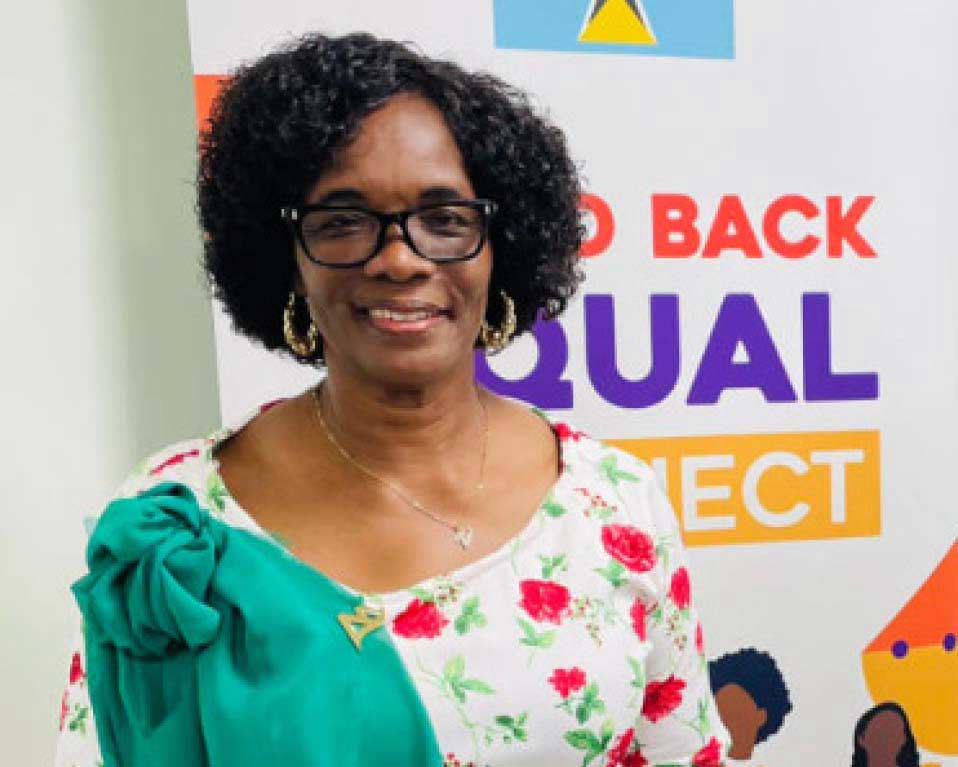
MINISTER for Gender Affairs Dr. Virginia Albert-Poyotte recently attended The Inter-American Convention on the Prevention, Punishment, and Eradication of Violence Against Women.
That event was held in Chile.
Also known as The Belém do Pará Convention, Albert-Poyotte said that “we (the Ministry of Gender Affairs) were able to give a report of what Saint Lucia has done so far.”
“I contributed on a panel which looked at how we can use technology to combat violence against women,” and how technology is also contributing to it, Albert-Poyotte told reporters at a press briefing last week.
She observed that with social media, individuals now have access to more information, adding that “there could be quite a bit of abuse. We have to be very careful (with) how we use technology so we don’t use it as a tool to continue” hurting women, Albert-Poyotte said.
The Inter-American Convention established that women have the right to live a life free of violence and that violence against women constitutes a violation of human rights and fundamental freedoms, as noted by the Organization of American States (OAS).
Interestingly, Saint Lucia’s Domestic Violence Bill was featured very prominently at the meeting “as one of the most progressive (pieces of) legislation looking at violence against women,” the minister said.
“Usually, you find a lot more women are abused in a domestic setting than men. We are looking at how we can continue putting legislations in place (and) engage in activities to raise the awareness of the public so that people continue to live in harmony with each other. Men and women are supposed to be equal partners,” the minister emphasized.
On the ‘Know Your Rights Campaign’ which was launched late last year by her ministry, Albert-Poyotte said “it’s a matter of raising awareness. Therefore, we have engaged in a number of training programmes. We have (billboards) erected in different locations so we are constantly reminding persons that people need to know their rights; do not allow persons to abuse you… whether you are a man or a woman.”
The campaign is still ongoing. Furthermore, she said, the Ministry of Gender Affairs is currently engaging a number of stakeholders in collaboration with the French government.
The Belém do Pará Convention has been ratified by 32 of the 34 full Member States of the (OAS), according to ‘Equality Now’.
Additionally, the website noted, states that are parties to the Convention are obligated to take specific actions to prevent, investigate, and punish violence against women.
This includes developing legal frameworks, educational programs to combat stereotypes, and offering specialized services for victims, ‘Equality Now’ reported.
“By recognizing violence against women as a violation of human rights and establishing a normative framework for addressing the violence and discrimination women and girls endure, this Convention signaled the beginning of a decisive change process in terms of legal and policy reforms,” ‘Equality Now’ observed.
“From the feminist movement’s perspective, the Belém do Pará Convention has been and continues to be a fundamental tool in urging States to create more effective laws, and implement them in a non-discriminatory way; to establish robust institutions like Ministries of Women; and to develop public policies aimed at combating the pervasive issue of violence against women.
This international instrument has been a crucial tool in strengthening civil society’s role in litigation, enabling civil society organizations and the feminist movement to influence the creation of national laws on violence against women, and in shaping public policies. It has also helped ensure specialized services for survivors, stronger legal frameworks, and new human rights standards,” the website added.
So what more can be done to protect the rights of women and girls?
According to the website, despite three decades of progress in establishing standards and procedures to combat violence against women, recent statistics remain alarming:
– Between 50% and 60% of women in the surveyed countries have experienced some form of gender-based violence in their lifetimes;
– 30% to 40% of women have been victims of physical or sexual violence.
Thus, ‘Equality Now’ concluded, more efforts are needed to address the heightened vulnerability experienced by racially marginalized women, lesbian women, women living in poverty, women with disabilities, and migrant women, among other groups.













